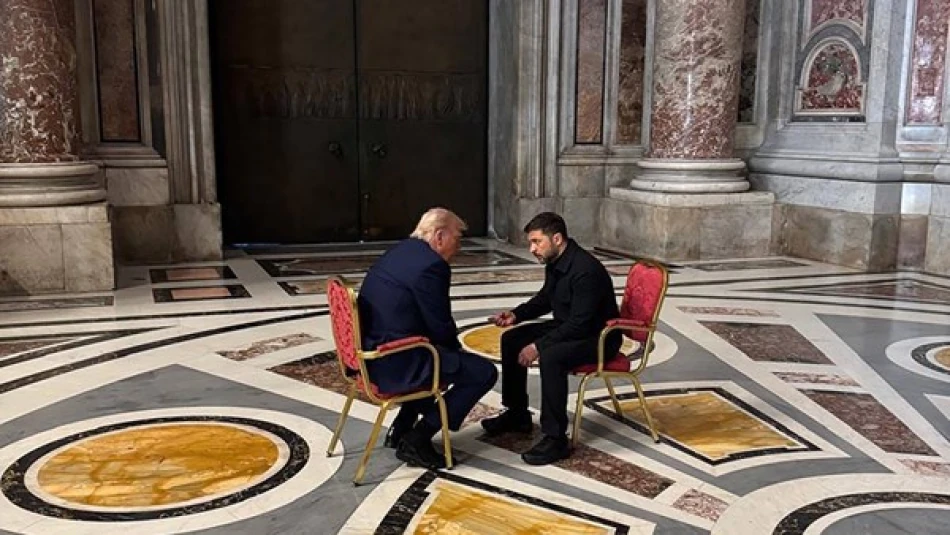
Zelensky and Trump Meet on Sidelines of UN General Assembly in New York
Zelensky and Trump Set for High-Stakes UN Meeting as Ukraine War Enters Critical Phase
Ukrainian President Volodymyr Zelensky will meet with former U.S. President Donald Trump next week on the sidelines of the UN General Assembly in New York, marking a potentially pivotal diplomatic moment as Ukraine's war effort faces mounting pressure and Trump campaigns for a return to the White House with promises to rapidly end the conflict.
A Meeting That Could Reshape Ukraine's Future
Zelensky announced the upcoming meeting to journalists, including AFP correspondents, revealing that he plans to discuss "a number of issues" with Trump. The timing is particularly significant, coming as Ukraine faces increasing battlefield challenges and growing questions about sustained Western military support.
This encounter represents more than routine diplomatic protocol. With Trump leading in several polls and maintaining his pledge to end the Ukraine war "within 24 hours" of taking office, Zelensky likely views this as a crucial opportunity to influence the former president's approach to the conflict.
Strategic Calculations Behind the Diplomatic Outreach
Ukraine's Hedging Strategy
Zelensky's willingness to engage with Trump demonstrates sophisticated diplomatic hedging. Unlike many European leaders who have maintained distance from the Republican candidate, Ukraine's president appears to recognize the electoral realities and potential policy shifts that could dramatically affect his country's survival.
This pragmatic approach mirrors how smaller nations often navigate great power politics—maintaining relationships across political divides to ensure continuity of support regardless of electoral outcomes.
Trump's Evolving Ukraine Position
The meeting comes as Trump faces pressure to articulate a more detailed Ukraine strategy beyond his campaign rhetoric. His previous statements suggesting he could quickly broker peace have raised concerns among Ukraine's supporters about potential territorial concessions to Russia.
However, Trump's unpredictable nature and desire to be seen as a successful dealmaker could work in Ukraine's favor if Zelensky can frame continued support as essential to achieving a "winning" outcome.
Broader Implications for U.S.-Ukraine Relations
Beyond Bilateral Diplomacy
The meeting occurs against the backdrop of shifting American political sentiment toward foreign aid and military intervention. Recent polling suggests growing war fatigue among American voters, making Ukraine's case for continued support increasingly challenging regardless of who occupies the White House.
Zelensky's direct engagement with Trump could signal a broader recalibration of Ukraine's diplomatic strategy, moving beyond traditional Democratic Party allies to build bipartisan American support for Ukraine's long-term security needs.
International Observers Take Note
European allies and NATO partners will be watching this meeting closely for signals about potential changes in U.S. commitment to Ukraine. Any perceived warming between Zelensky and Trump could either reassure allies about continuity or raise concerns about backroom dealmaking that might compromise Ukraine's territorial integrity.
The encounter also sends a message to Putin's Russia that Ukraine maintains high-level access across the American political spectrum, potentially complicating Moscow's calculations about waiting out current U.S. support.
What Success Looks Like
For Zelensky, a successful meeting would involve securing Trump's commitment to maintaining military aid and avoiding any public statements that could be interpreted as supporting territorial concessions. The Ukrainian president needs to demonstrate that supporting Ukraine aligns with Trump's "America First" philosophy by emphasizing how Ukrainian resistance weakens a key U.S. adversary.
Trump, meanwhile, likely seeks to appear presidential and engaged on foreign policy while avoiding commitments that could constrain his options if elected. The meeting allows him to demonstrate diplomatic gravitas without the responsibilities of actual governance.
As both leaders navigate their respective political pressures, this UN sideline meeting could prove instrumental in shaping not just bilateral relations, but the broader trajectory of the conflict that has already reshaped European security architecture and global geopolitics.
Most Viewed News

 Layla Al Mansoori
Layla Al Mansoori






